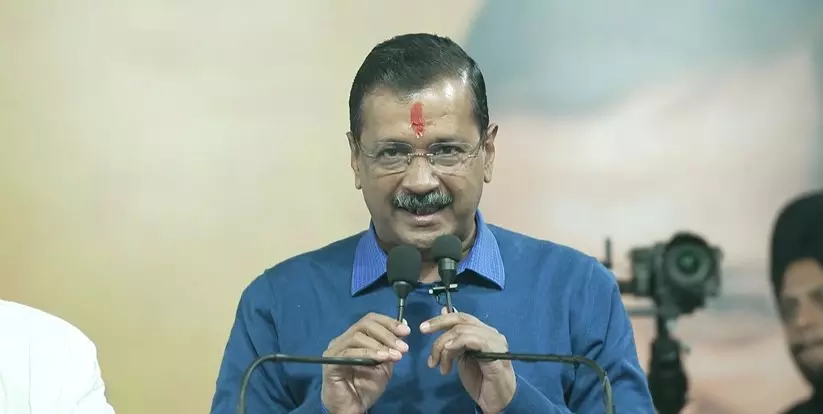Delhi polls: AAP launches middle class manifesto

New Delhi: As the Delhi Assembly election draws nearer, the AAP on Wednesday launched a new plank to target the BJP’s core middle class vote bank by releasing a seven-point list of key demands for the Centre to address in the upcoming Budget, for boosting its prospects among the middle class electorate. Dubbing the seven-point demands as a “middle class manifesto", party supremo Arvind Kejriwal painted them as a “victim of tax terrorism” and demanded that the Centre grant concessions to them like hike in the income-tax exemption limit, among other steps, in the Union Budget.
In a video message, the former chief minister announced demands to address the concerns of the middle class that included raising the education budget from the current two per cent to 10 per cent and capping private school fees. He also proposed subsidies and scholarships for higher education to make quality education accessible to all.
The AAP chief stressed the need for an increase in healthcare spending, suggesting a rise to 10 per cent of GDP, along with the removal of taxes on health insurance premiums.
Mr Kejriwal also called for an increase in the income-tax exemption limit from `7 lakhs to `10 lakhs, citing the heavy financial burden on the middle class.
Another demand was the removal of GST on essential goods, which Mr Kejriwal argued disproportionately affects middle class households. He also urged the Centre to introduce robust retirement plans for senior citizens, including free healthcare for them in both private and government hospitals.
Additionally, the former chief minister demanded the Central government to reinstate the 50 per cent concession on train fares for senior citizens, which was discontinued in recent years.
Mr Kejriwal criticised political parties for reducing the middle class to what he described as a "slave mindset" since Independence. He pledged that AAP MPs would raise the voice of the middle class in the coming Parliament sessions, vowing to make their issues a central focus of the political discourse.
“Many promises are made in the name of religion, many in the name of caste, some for the lower sections of society, and others for a handful of industrialists. Why does this happen? Because other political parties have created their vote banks based on religion and caste, and they must appease big industrialists because they rely on them for donations. So, in a way, these industrialists are their "note bank," and the rest of the people are their "vote bank”, he said.
“Amid this "vote bank" and "note bank" system, there is a large class that is completely sidelined. They belong neither here nor there,” he noted, saying, “This class is India's middle class. No political party today is ready to address the interests of the middle class. Why is this so? In the 75 years since independence, one party after another came to power, one government replaced the previous, and all these parties have oppressed, intimidated, and squeezed the middle class,” he said.
The announcement comes just weeks before the Delhi Assembly elections scheduled for February 5, with the results to be declared on February 8. The Aam Aadmi Party, which won 62 of the 70 Assembly seats in 2020, is seeking a third consecutive term.

